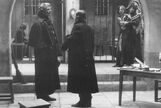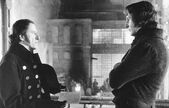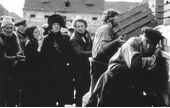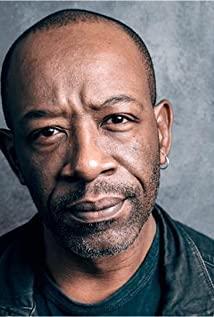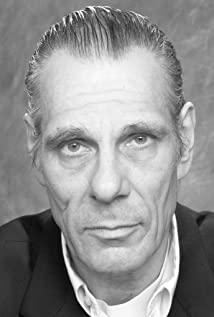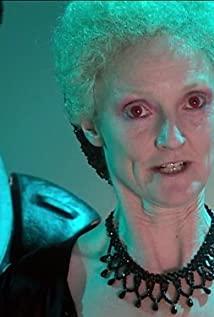The film is adapted from the French novel "Les Miserables" by Victor Hugo, with the Napoleonic Wars and more than ten years as the background. At that time, the society was turbulent, and the political system was very unequal to people of different classes. The people at the bottom were suffering from poverty, hunger, exclusion and oppression. Almost all laws protected the nobles. Even if the nobles oppressed the people at the bottom, the only ones who were severely punished would be the poor. Common people. Therefore, the bottom society of France became a miserable world, which also promoted the "Republican Uprising in Paris in 1832". The ideas advocated by the uprising were similar to the guiding ideology of the French Revolution, namely "freedom, equality and fraternity." Born in troubled times, Hugo witnessed the suffering of the people, and finally created this novel, and integrated French history, revolution, war, moral philosophy, law, justice and religious beliefs. The film is slightly modified on the basis of the novel. It revolves around the fate of the protagonist Jean Valjean and tells the tragedy of the bottom society and the people's eager demand for equality and fraternity. Other important roles in the film include Inspector Chavey, who is the defender of the political system and always believes that people who make mistakes will not reform; Fantine, the worker, is a representative of the bottom society who has been tortured by life; Fantine's daughter Cosé Special, simple and kind, and Ran Valjean depend on each other; Maris, a member of the uprising, is a passionate youth who advocates equality. Stories of ill-fated and intertwined emotions unfolded between them.
When Ran Valjean was young, because of hunger, he broke the glass window of the bakery and stole a piece of bread, so he was arrested and sentenced to 19 years in prison. In jail, Ran Valjean did hard work and suffered inhuman treatment such as beatings and verbal abuse. His dignity was ruthlessly trampled on. After parole, Jean Valjean had a yellow certificate. Such a certificate itself was inequality and it was not easy to find a job. Even if he did a coolie, his salary was only half of that of ordinary people, and he was also required to report elsewhere and continue to suffer. Oppression, if you do not report, you will face life imprisonment. In despair, Jean Valjean was lying on the street in the dark, with no food or house, and he thought that no one wanted to take him in. At this time, an old lady came over and encouraged Jean Valjean to ask Bishop Dine. With the old lady’s persuasion, Jean Varjean knocked on the bishop’s door and explained his identity. He was supposed to be treated by the master church. Turning the door away, but the bishop invited him to dinner and gave him a comfortable bed to sleep. Ran Valjean was very moved and promised the bishop that he would be a new man from tomorrow. However, 19 years of horrific experience became his nightmare. He was terrified of life and injured the bishop in the middle of the night and stole the silver tableware. When the police caught him in front of the bishop, the bishop said that the silver tableware was given to him. Yes, he also gave him his silver candlestick, and said to him, "Don’t forget, never forget, you promised to be a human again, Ran Valjean, you are my brother, you are not a bad person, I exchanged these silverware for your soul and redeemed you from fear and resentment. Now, I return you to God." The bishop's forgiveness completely destroyed the soul of Ranvarjean who wanted to sin. Since then, he has reformed and treated everyone with kindness and forgiveness.
Ran Valjean changed his name. In 9 years, he went from being a worker to being a factory owner, and then happily and kindly, working for the welfare of the people, and using kindness to save thousands of suffering people. Therefore, he was elected as the city of Vigao. long. Ran Valjean lived in a simple house, didn't like to talk, liked to be alone, but always pretended to be a citizen in his heart. One day, Paris sent Chavie inspector to Vigao to manage the police. Chavie met with Ran Valjean, the good mayor of the people, and Ran Valjean recognized at first sight that Chavie was abusing himself while doing hard labor. That person. From then on, Jean Valjean's peaceful life was broken, and the contradiction between him and Chavi, who had always implemented "fair enforcement", began. As a precaution, Jean Valjean immediately took out all the money he had earned over the years and buried it under a tree. He also donated a portion of the money to the monastery where the bishop who helped him was 9 years ago, and arranged for his injured old man. The employee Rafi went there to work as a handyman. Coincidentally, Ranval broke the peace of the factory. Fantine is a young and beautiful employee. After the outbreak of the Industrial Revolution, she was young and energetic and planned to develop from the country to the city, but was tricked into abandoning by a young man in the city. At this time Fantine found out that she was pregnant and had an illegitimate child. She dared not go back to the country again. Given that the social system at that time was very exclusive Unmarried women with children join the work, and in desperation, Fantine fosters his daughter Cosette in a friend's house. Fantine’s friend is greedy and constantly asks Fantine for living expenses for various reasons, but actually abuses Cosette by various means. In order to support her daughter, Fantine chose to enter Ranva to work in the factory. Everything was going well, but her beauty and talents were often jealous, especially when the foreman knew that she had an illegitimate daughter and expelled her logically. Desperate Fantine sold her hair to support herself and her daughter, and became a prostitute. Soon after she worked hard, she became ill and contracted pneumonia. Fantine once solicited guests on the street and was molested and beaten by the guests. After inspecting this, Dr. Chavey let a few nobles leave and continued to beat Fantine. There was no justice under the system. Ran Valjean rescued Fantine in the name of the mayor, let Fantine cultivate in his office, and showed her that he did not know about the expulsion. However, Fantine became more and more ill, and Ran Valjean’s troubles continued one after another. After seeing the strength of Ran Valjean, Chavey began to suspect that he was fleeing hard labor, but after a few days, Chavy did not find any evidence, and the court said that Ran Valjean had been caught. Jean Valjean is caught in a self-conflict: If he does not go to the court to testify, an innocent person will suffer because of himself, and if he does testify, Fantine and her daughter will be left unattended. In the end, Ranval was wronged for those who could not sit back and watch the innocent. He confessed his experience of hard labor in court and lost the position of mayor as a result. After receiving the news, Chavi rushed to Ran Valjean's office. Fantine died under the stimulus. An angry Ran Valjean stunned Chavi and decided to fulfill his promise to Fantine, that is, to raise Cosette.
When Jean Valjean saw the abused Cosette at Fantine’s friend’s house, he took out the certificate of support written by Fantine, and took Cosette to Paris, where he lived in the monastery where Lafite was. Cosette spent his childhood, and Jean Valjean also spent a period of peace. Cosette didn't like to be a nun. She was full of curiosity about the outside world, so Jean Valjean rented a house outside under the name of Lafite, and usually took Cosette to serve the refugees or do other things. One day, Cosette saw Maris’s wonderful speech on the street, and he admired him, and Maris also noticed that this beautiful and innocent girl followed the girl and developed a feeling of admiration. In order to protect Cosette Especially, preventing further contact between them. Maris finally found Cosette's residence. They would sit on a bench every night and date. The two fell in love, which once again aroused the conflict between Jean Valjean and Chavie.
Maris was the leader of the "Paris Republican Uprising". Inspector Chavey had been sending people to follow him. After learning that Maris was in love, he began investigating his girlfriend. Chavey came to Maris’s girlfriend’s house, which made Ran Wajean panicked again, and immediately took Cosette out of the place and rented a new house. Chavey finally determined that Maris’ lover was Cosette, and Cosette’s father was the Jean Valjean he had been looking for. He followed Maris and came to Jean Valjean’s residence, intending to use Cosette as a threat. But he was accidentally controlled by Maris. Chavey was arrested in the Republican organization, and it was Jean Valjean who executed the execution for Chavey. When Chavy felt certain that he was going to die, Jean Valjean forgave him again. After the war started, Jean Valent knew that Cosette loved Maris deeply. In order to give Cosette a bright future, he ran to the battlefield alone and gave his life to rescue the injured Maris. He dragged Maris out through the sewer, but The two were captured by Chavi at the exit. Chavie’s goal was Jean Valjean, so at Jean Valjean’s request, Chavie released Maris and sent him back to Cosette. Chavey and Ranvarjean were standing by the river. At this time, Chavey began to suspect that he was blindly "enforcing the law impartially." He began to believe that people can be reformed, and he began to understand that the system he represented brought misery to the people. The world, and Valjean’s forgiveness and fraternity can turn misery into warmth; Chavy asked Valjean "Why didn’t you kill me and hate me?" Ran Valjean replied, "I have no right to kill you, I don’t hate you , I don’t feel anything”; Chavey was overwhelmed by the fraternity of Varjean, he finally released Varjean, but plunged into the river to end his life; Varjean who was free walked forward with excitement. This scene is like the fall of the old system, the budding of the new system, and the darkness of society will eventually be illuminated by freedom, equality and fraternity.
From a simple laborer to hard labor in a prison, to the mayor of Vigao, to ordinary citizens, to complete freedom, the ups and downs of his life were accompanied by the sublimation of his inner spiritual world. The bishop redeemed him when he was desperate. His soul has enabled him to implement the concepts of forgiveness, equality, and fraternity throughout his life, helping countless people who have suffered from life. Fantine's life experience is the epitome of poor people. Because of Jean Valjean's fraternity, Fantine was saved and Fantine's daughter was spared from suffering. Inspector Chawi is a representative of the social system. His due diligence has brought suffering to the people. In the end, the barriers in his heart were broken by the forgiveness of Ranvaljean, which made him believe that people can reform and reform. Freedom, equality, fraternity, and forgiveness have an invisible power, like a beam of light entering the dark corners of society, shining into the hearts of the people, and redeeming the souls of crime and suffering. Life is like a mirror. If we have fraternity in our hearts, we may see a world full of love, and if we have hatred in our hearts, what we see may be a world full of hatred. We may be struggling between good and evil, perhaps someone is hostile to ourselves, or someone needs help. At this time, can we treat the world with equality, fraternity, and forgiveness?
View more about Les Misérables reviews



